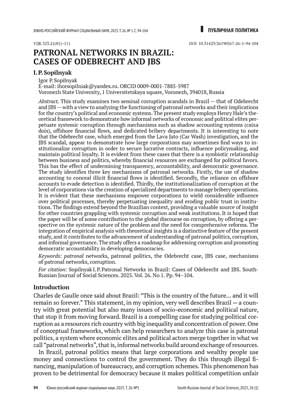Abstract
This study examines two seminal corruption scandals in Brazil – that of Odebrecht and JBS – with a view to analyzing the functioning of patronal networks and their implications for the country's political and economic systems. The present study employs Henry Hale's theoretical framework to demonstrate how informal networks of economic and political elites perpetuate systemic corruption through mechanisms such as shadow accounting systems (caixa dois), offshore financial flows, and dedicated bribery departments. It is interesting to note that the Odebrecht case, which emerged from the Lava Jato (Car Wash) investigation, and the JBS scandal, appear to demonstrate how large corporations may sometimes find ways to institutionalize corruption in order to secure lucrative contracts, influence policymaking, and maintain political loyalty. It is evident from these cases that there is a symbiotic relationship between business and politics, whereby financial resources are exchanged for political favors. This has the effect of undermining transparency, accountability, and democratic governance. The study identifies three key mechanisms of patronal networks. Firstly, the use of shadow accounting to conceal illicit financial flows is identified. Secondly, the reliance on offshore accounts to evade detection is identified. Thirdly, the institutionalization of corruption at the level of corporations via the creation of specialized departments to manage bribery operations. It is evident that these mechanisms empower corporations to wield considerable influence over political processes, thereby perpetuating inequality and eroding public trust in institutions. The findings extend beyond the Brazilian context, providing a valuable source of insight for other countries grappling with systemic corruption and weak institutions. It is hoped that the paper will be of some contribution to the global discourse on corruption, by offering a perspective on the systemic nature of the problem and the need for comprehensive reforms. The integration of empirical analysis with theoretical insights is a distinctive feature of the present study, and it contributes to the advancement of understanding of patronal politics, corruption, and informal governance. The study offers a roadmap for addressing corruption and promoting democratic accountability in developing democracies.Keywords
References
Avritzer, L. (2020). Democracy and the Public Space in Latin America. N.J.: Princeton University Press.
Agência Brasil (2018, November 29). Extraordinary minister Denies he Received Money from JBS in 2012. Retrieved from https://agenciabrasil.ebc.com.br/en/politica/noticia/2018–11/extraordinary-minister-denies-he-received-money-jbs‑2012
Batista, J. (2017). JBS and the Corruption of Brazilian Politics. Folha de S. Paulo.
Burdett, C. (2015). Shadow Campaigns: The Role of Informal Finance in Brazilian Elections. Journal of Latin American Studies, 47(3), 567–589.
Campos, N., Giovannoni, F. (2007). Lobbying, Corruption, and Political Influence. Public Choice, 131(1–2), 1–21.
Chatfield, T. (2020). Qualitative Methods in Political Science Research. UK: Sage Publications.
Dowbor, L. (2020). Inequality and Politics in Brazil: Bolsa Familia and Beyond. Economics and Business Review, 6(4), 7–26. DOI: 10.18559/ebr.2020.4.2
Fearnside, P.M. (2006). Emerging Threats to Tropical Forests. Chicago: University of Chicago Press.
Ferreira, R., Couto, F., Vilela, B. (2024). Estratégia de Influência e o modus operandi: análise dos casos de JBS e Odebrecht. Papel Político, 29, 22. DOI: 10.11144/Javeriana.papo29.eimo
Food Safety News. (2023). JBS Admits to Paying $180 Million in Bribes. Retrieved from https://www.foodsafetynews.com/2023/12/brazilian-judge-cuts‑2–1‑billion-off-jbs-owners-bribery-fines/
Folha, de S. Paulo. (2017). JBS and the Corruption of Brazilian Politics. Retrieved from https://www1.folha.uol.com.br
Garay, J., Macias Fernandez, G., Guerra Villamizar, N., Rojas, L. et al. (2018). The “Lava Jato” Network: Corruption and Money Laundering in Brazil. DOI: 10.13140/RG.2.2.18911.15523
Geddes, B., Neto, A.R. (1992). Institutional Sources of Corruption in Brazil. Third World Quarterly, 13(4), 641–661. DOI: 10.1080/01436599208420302
Hale, H. (2015). Patronal Politics: Eurasian Regime Dynamics in Comparative Perspective. Cambridge University Press.
Hunter, W., Power, T. (2008). Rewarding Lula: Executive Power, Social Policy, and the Brazilian Elections of 2006. Latin American Politics and Society, 50(1), S. 1–30.
Junior, C. (2020). Odebrecht and the Institutionalization of Corruption in Brazil. Brazilian Journal of Political Science, 39(2), 45–67.
Leal, V.N. (2009). Coronelismo: The Municipality and Representative Government in Brazil. Cambridge University Press.
Medeiros, L. (2021). The Bribery Ledger: How JBS Used Shadow Accounting to Influence Politics. Revista Brasileira de Ciência Política, 45(3), 78–95.
Ministério Público Federal (MPF). (2025). Operação Lava Jato: Documentos e Relatórios. Retrieved from https://www.mpf.mp.br
Melo, M.A., Pereira, C. (2024). Why Didn’t Brazilian Democracy Die? Latin American Politics and Society, 66(4), 1–27. DOI: 10.1017/lap.2024.4
Paula, L., Moura, R. (2021). A Operação Lava Jato e as Mudanças na Gestão da Petrobrás: Uma avaliação dos impactos econômicos gerais e locais. In Operação Lava Jato: crime, devastação econômica e perseguição política (pp. 113–145). São Paulo: Expressão Popular.
Peters, B.G., Filgueiras, F. (2022). Introduction: Looking for Governance: Latin America Governance Reforms and Challenges. International Journal of Public Administration, 45(4), 299–307. DOI: 10.1080/01900692.2021.2020905
Power, T.J., Taylor, M.M. (Eds) (2011). Corruption and Democracy in Brazil: The Struggle for Accountability. Notre Dame: University of Notre Dame Press. DOI: 10.2307/j.ctv19m61t1
Reuters (2017, May 31). Brazil’s J&F Agrees to Pay Record $3.2 Billion Fine in Leniency Deal. Retrieved from https://www.reuters.com/article/us-brazil-corruption-jbs-idUSKBN18R1HE/
Samuels, D. (2003). The “Gubernatorial Coattails Effect”: Federalism and Congressional Elections in Brazil. In Ambition, Federalism, and Legislative Politics in Brazil (pp. 79–108). Cambridge: Cambridge University Press.
Transparency International (2022). Corruption Perceptions Index 2022. Retrieved from https://images.transparencycdn.org/images/Report_CPI2022_English.pdf
U.S. Department of Justice (2016). Odebrecht and Braskem Plead Guilty and Agree to Pay at Least $3.5 Billion in Global Penalties to Resolve Largest Foreign Bribery Case in History. Retrieved from https://www.justice.gov/opa/pr/odebrecht-and-braskem-plead-guilty-and-agree-pay-least‑35‑billion-global-penalties-resolve
U.S. Department of Justice (2016). Two Bank Executives Charged with Conspiring to Launder Hundreds of Millions of Dollars Through U.S. Financial System. Retrieved from https://www.justice.gov/opa/pr/two-bank-executives-charged-conspiring-launder-hundreds-millions-dollars-through-us-financial
World Inequality Database (2022). Income Inequality in Brazil. Retrieved from https://wid.world/country/brazil/


